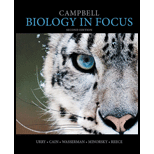
Campbell Biology in Focus (2nd Edition)
2nd Edition
ISBN: 9780321962751
Author: Lisa A. Urry, Michael L. Cain, Steven A. Wasserman, Peter V. Minorsky, Jane B. Reece
Publisher: PEARSON
expand_more
expand_more
format_list_bulleted
Question
Chapter 43.5, Problem 2CC
Summary Introduction
To calculate: The ecological footprint of a person and what measures can be taken to reduce the ecological footprint.
Introduction:
Ecological footprint of a person measures that individual’s demand on nature. It is calculated according to the daily activities of a person. The food habits, energy consumption, trash generation, land used, and wastage of products used by a person are the factors that contribute to the ecological footprint of a person.
Expert Solution & Answer
Want to see the full answer?
Check out a sample textbook solution
Students have asked these similar questions
What are biofertilizers and mention the significance
PCBs and River Otters: Otters in Washington State’s Green-Duwamish River have high levels of polychlorinated biphenyls (PCBs) in their livers. PCBs can bind to the estrogen receptors in animals and disrupt the endocrine system of these otters. The PCBs seem to increase the estrogen to androgen ratio, skewing the ratio toward too much estrogen.
How would increased estrogen affect the river otter population?
Based on your reading of the materials in this unit, what factors can affect fertility in humans?
Explain how each of the factors affecting human fertility that you described can disrupt the human endocrine system to affect reproduction.
Other than oil and alcohol, are there other liquids you could compare to water (that are liquid at room temperature)?
How is water unique compared to these other liquids?
What follow-up experiment would you like to do, and how would you relate it to your life?
Chapter 43 Solutions
Campbell Biology in Focus (2nd Edition)
Ch. 43.1 - Prob. 1CCCh. 43.1 - Prob. 2CCCh. 43.1 - WHAT IF? Imagine two populations of a fish...Ch. 43.2 - How does the reduced genetic diversity of small...Ch. 43.2 - Prob. 2CCCh. 43.2 - WHAT IF? In 2005, at least ten grizzly bears in...Ch. 43.3 - Prob. 1CCCh. 43.3 - Prob. 2CCCh. 43.3 - Prob. 3CCCh. 43.4 - How can the addition of excess mineral nutrients...
Ch. 43.4 - MAKE CONNECTIONS There are vast stores of organic...Ch. 43.5 - Prob. 1CCCh. 43.5 - Prob. 2CCCh. 43.6 - Prob. 1CCCh. 43.6 - Prob. 2CCCh. 43.6 - WHAT IF? Suppose a new fishery is discovered, and...Ch. 43 - One characteristic that distinguishes a population...Ch. 43 - Prob. 2TYUCh. 43 - Prob. 3TYUCh. 43 - Prob. 4TYUCh. 43 - Prob. 5TYUCh. 43 - Prob. 6TYUCh. 43 - DRAW IT (a) Estimate the average CO2 concentration...Ch. 43 - Prob. 8TYUCh. 43 - FOCUS ON EVOLUTION The fossil record indicates...Ch. 43 - Prob. 10TYUCh. 43 - SYNTHESIZE YOUR KNOWLEDGE Big cats, such as the...
Knowledge Booster
Learn more about
Need a deep-dive on the concept behind this application? Look no further. Learn more about this topic, biology and related others by exploring similar questions and additional content below.Similar questions
- Selection of Traits What adaptations do scavengers have for locating and feeding on prey? What adaptations do predators have for capturing and consuming prey?arrow_forwardCompetition Between Species What natural processes limit populations from growing too large? What are some resources organisms can compete over in their natural habitat?arrow_forwardSpecies Interactions Explain how predators, prey and scavengers interact. Explain whether predators and scavengers are necessary or beneficial for an ecosystem.arrow_forward
- magine that you are conducting research on fruit type and seed dispersal. You submitted a paper to a peer-reviewed journal that addresses the factors that impact fruit type and seed dispersal mechanisms in plants of Central America. The editor of the journal communicates that your paper may be published if you make ‘minor revisions’ to the document. Describe two characteristics that you would expect in seeds that are dispersed by the wind. Contrast this with what you would expect for seeds that are gathered, buried or eaten by animals, and explain why they are different. (Editor’s note: Providing this information in your discussion will help readers to consider the significance of the research).arrow_forwardWhat is the difference between Uniporters, Symporters and Antiporters? Which of these are examples of active transport?arrow_forwardWhat are coupled transporters?arrow_forward
- How do histamine and prostaglandins help in the mobilization of leukocytes to an injury site? What are chemotactic factors? How do they affect inflammation process?arrow_forwardCompare and contrast neutrophils and macrophages. Describe two ways they are different and two ways they are similar.arrow_forwardDescribe the effects of three cytokines (not involved in the initial inflammation response). What cells release them?arrow_forward
arrow_back_ios
SEE MORE QUESTIONS
arrow_forward_ios
Recommended textbooks for you

What is food insecurity?; Author: RWJBarnabas Health;https://www.youtube.com/watch?v=fXXiuLgiL18;License: Standard youtube license